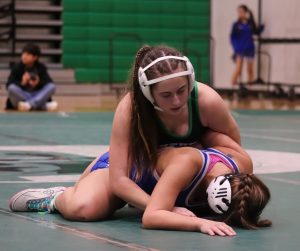Page 2: Creating healthy relationships in classes
November 17, 2021
It’s normal to have a favorite teacher. A teacher who, when you walk into their classroom, brightens up your day.
But these relationships can sometimes go too far. On Oct. 18, Cody Chitwood, a former special education teacher at Derby Middle School, was sentenced to three years of probation in a child pornography case.
Chitwood faced 11 counts of sexual exploitation of a child, and pleaded guilty to two counts of them.
His is an extreme case, but does it serve as a warning about student-teacher relationships?
“I think that teachers should be able to recognize when a student is getting too close to them,” junior Naomi Island said. “… Let them know that they’re in a professional setting and not to take the relationship so far.”
There is a line that should not be crossed. Sometimes, the line is tough to find.
“If it doesn’t pertain to schoolwork in that class and you are like, telling the teacher about your personal life, I think that’s where you should draw the line,” Island said. “I don’t think that teachers and students should have relationships where they are talking about things that are happening in their own personal lives.”
Kids will tell teachers about serious aspects of their life, including abuse, rape, medical problems and home issues.
Teachers are mandatory reporters because their job is to protect students.
Teachers are still wary of these types of relationships, however.
“I think just knowing your boundaries, and just being aware of that, so like, there’s definitely a professional point that you need to make sure that you’re maintaining,” teacher Dianna Beck said. “But you also need to remember that you are an adult in a situation at all times, and that you’re in a leadership position and that you’re also in a position of power.”
This position of power can lead to teachers influencing students in ways that could harm them because the student can’t say no to someone with authority over them.
Relationships with teachers are necessary in the classroom, however.
They can provide stability in the classroom along with bolstering overall attitude.
“I think I try really hard to just show mutual respect with them. So like if you open that door of mutual respect and a lot of times, you can open up conversations then that kind of thing naturally just starts to build,” Beck said.
If a student is uncomfortable, there are options at the school.
“I think in that situation, if they felt like a comment was made to them, or they heard something from a teacher, I think they would want to go to a safe person that they trust,” DHS social worker Stacie Hadley said. “…Then that same person can take them to admin, and whatever principals would then be able to address the situation.
“But they definitely have to say something.”





